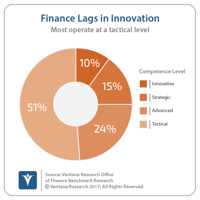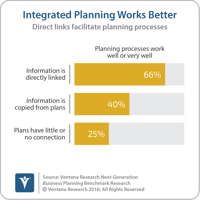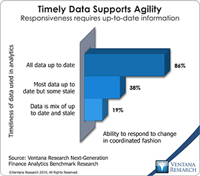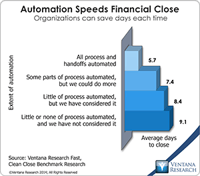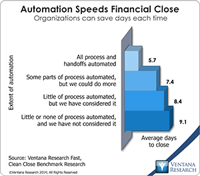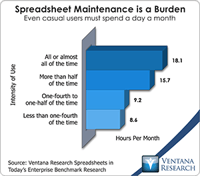I recently attended BlackLine’s annual user conference. The company aims to automate time-consuming repetitive tasks and substantially reduce the amount of detail that individuals must handle in the department. The phrase “the devil is in the details” certainly applies to accounting, especially managing the details in the close-to-report phase of the accounting cycle, which is where BlackLine plays its role. This phase spans from all the pre-close activities to the publication of the financial...
Read More
Topics:
automation,
close,
closing,
Consolidation,
control,
effectiveness,
Reconciliation,
CFO,
compliance,
Data,
controller,
Financial Performance Management,
FPM,
Sarbanes Oxley,
Accounting,
process management,
report
For several years, I’ve commented on a range of emerging technologies that will have a profound impact on white-collar work in the coming decade. I’ve now coined the term “Robotic finance” to describe this emerging focus, which includes four key areas of technology: Artificial intelligence (AI) and machine learning (ML), robotic process automation (RPA), bots utilizing natural language processing, and blockchain distributed ledger technology (DLT), each of which I describe below. Robotic...
Read More
Topics:
ERP,
Machine Learning,
close,
Consolidation,
Continuous Accounting,
Reconciliation,
CFO,
Robotic Process Automation,
blockchain,
AI,
natural language processing,
Accounting,
RPA,
bots,
voice automation
Prophix is an established provider of financial performance management (FPM) software for planning and budgeting, forecasting, analysis and reporting, and managing the financial close and consolidation process. Its eponymous software is designed specifically for midsize companies or midsize divisions of larger corporations. These organizations are a distinctive segment of the market in that they have almost all the functional requirements of large enterprises but have fewer resources to apply...
Read More
Topics:
Planning,
Office of Finance,
Reporting,
Budgeting,
Consolidation,
Continuous Planning,
Analytics,
Business Intelligence,
Collaboration,
Financial Performance Management,
Integrated Business Planning,
accounting close,
Price and Revenue Management,
Work and Resource Management,
Sales Planning and Analytics
Centage recently released Budget Maestro Version 9, a complete revamping of its longstanding budgeting application designed for midsize companies. The software, now offered as a multitenant cloud-based offering, delivers several structural improvements that can enhance the effectiveness of a company’s planning processes and at the same time is easier to use. Budget Maestro Version 9 is designed to support what Centage is calling a “Smart Budgets” approach to replace traditional budgeting. This...
Read More
Topics:
Planning,
Reporting,
Budgeting,
Consolidation,
Analytics,
Business Planning,
headcount planning
Ventana Research defines financial performance management (FPM) as the process of addressing often overlapping issues involving people, process, information and technology that affect how well finance organizations operate and support the activities of the rest of their organization. FPM software supports and automates the full cycle of finance department activities, which include planning and budgeting, analysis, assessment and review, closing and consolidation, internal financial reporting...
Read More
Topics:
Performance Management,
ERP,
FP&A,
Human Capital Management,
Office of Finance,
Consolidation,
Financial Performance Management,
FPM
The topic of corporate governance received renewed attention recently after the publication of an open letter signed by 13 prominent business leaders, including Warren Buffett of Berkshire Hathaway and Jamie Dimon of JPMorgan Chase. The first principle the group advocated in the letter is the need for a truly independent board of directors. To achieve that aim, the letter suggests having the board meet regularly without the CEO and that the members of the board should have “active and direct...
Read More
Topics:
Mobile,
Governance,
Human Capital Management,
Office of Finance,
Consolidation,
Reconciliation,
CFO,
CEO,
board of directors,
accounting close
The ERP market is set to undergo a significant transformation over the next five years. At the heart of this transformation is the decade-long evolution of a set of technologies that are enabling a major shift in the design of ERP systems – the most significant change since the introduction of client/server systems in the 1990s. Some ERP software vendors increasingly are utilizing in-memory computing, mobility, in-context collaboration and user interface design to differentiate their...
Read More
Topics:
Performance Management,
ERP,
FP&A,
Human Capital,
Office of Finance,
Reporting,
Consolidation,
Reconciliation,
Analytics,
Business Analytics,
Business Performance,
Financial Performance,
Uncategorized,
Financial Performance Management,
FPM
Tagetik provides financial performance management software. One particularly useful aspect of its suite is the Collaborative Disclosure Management (CDM). CDM addresses an important need in finance departments, which routinely generate highly formatted documents that combine words and numbers. Often these documents are assembled by contributors outside of the finance department; human resources, facilities, legal and corporate groups are the most common. The data used in these reports almost...
Read More
Topics:
Big Data,
Mobile,
ERP,
Human Capital Management,
Modeling,
Office of Finance,
Reporting,
Budgeting,
close,
closing,
Consolidation,
Controller,
Finance Financial Applications Financial Close,
IFRS,
XBRL,
Analytics,
Business Analytics,
Business Intelligence,
Business Performance,
Financial Performance,
Governance, Risk & Compliance (GRC),
CFO,
compliance,
Data,
benchmark,
Financial Performance Management,
financial reporting,
FPM,
GAAP,
Integrated Business Planning,
Profitability,
SEC Software
Reconciling accounts at the end of a period is one of those mundane finance department tasks that are ripe for automation. Reconciliation is the process of comparing account data (at the balance or item level) that exists either in two accounting systems or in an accounting system and somewhere else (such as in a spreadsheet or on paper). The purpose of the reconciling process is to identify things that don’t match (as they must in double-entry bookkeeping systems) and then assess the nature...
Read More
Topics:
Office of Finance,
automation,
close,
closing,
Consolidation,
Controller,
effectiveness,
Reconciliation,
XBRL,
Business Performance,
Financial Performance,
Governance, Risk & Compliance (GRC),
CFO,
Data,
Document Management,
Financial Performance Management,
FPM
Host Analytics has introduced AirliftXL, a new feature of its cloud-based financial performance management (FPM) suite that enables its software to translate users’ spreadsheets into the Host Analytics format. I find it significant in three respects. First, it can substantially reduce the time and resources it takes for a company to go live in adopting the Host Analytics suite, lowering the cost of implementation and accelerating time to value. Second, it enables Host Analytics users who have...
Read More
Topics:
Modeling,
Office of Finance,
Reporting,
closing,
Consolidation,
Controller,
Host Analytics,
Operational Performance,
Analytics,
Business Analytics,
Business Performance,
Cloud Computing,
Financial Performance,
Workforce Performance,
CFO,
Financial Performance Management,
FPM

